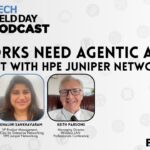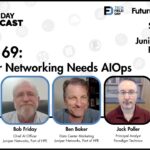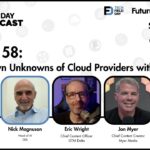Modern data mobility is challenging the laws of physics; the speed of light is a fundamental limit for moving signals. This episode of the Tech Field Day podcast features Kurt Kuckein from Hammerspace discussing data movement and management with Jim Jones, Jack Poller, Andy Banta, and Alastair Cooke. The challenge is that the distributed nature of data, spread across the globe, creates significant obstacles for AI, particularly regarding the speed of light and power consumption. We delve into overcoming these limitations through technologies that facilitate data access and movement, touching on concepts such as efficient storage solutions (Open Flash Platform), the importance of centralized data management, and the agility required for evolving AI workloads. While the underlying principles of data management are not new, the scale and complexity of AI necessitate innovative approaches to ensure data can be accessed and utilized effectively, regardless of its physical location.
DNS Must Be Secured Presented by Infoblox
DNS security is no longer optional. This service is not only being attacked by nefarious actors but it is also being leveraged in ways to compromise users and exfiltrate data. In this episode of the Tech Field Day podcast, brought to you by Infoblox, Tom Hollingsworth is joined by Jack Poller and Cricket Liu. They talk about the historical openness of DNS and how that has led to it becoming easy to see what users are doing and create ways to manipulate them. They discuss ways to secure the protocol and how companies like Infoblox are extending the capabilities for future security.
Your Edge Projects will Fail Without Fleet Lifecycle Management with ZEDEDA
Projects to deliver applications to edge locations will fail without comprehensive fleet lifecycle management. This episode of the Tech Field Day podcast features Sachin Vasudeva from Zededa discussing the importance of long-term edge management with Guy Currier and Alastair Cooke. There are unique challenges of managing edge deployments compared to cloud or on-premises environments. Focusing on business logic and application outputs while leveraging infrastructure providers to handle the complexities of packaging, deploying, and monitoring AI models enables diverse edge environments. Edge locations might have different hardware deployed, intermittent connectivity, requiring a balance between standardization and flexibility in managing edge devices and applications. Teams with rapid responsiveness and adaptation will better enable their business to respond to changing conditions, especially with the rapid pace of AI innovation.
Unified Flash Memory and Reduced HBM are Reshaping AI Training and Inference with Phison
AI will need less HBM (high bandwidth memory) because flash memory unification is changing training and inference. This episode of the Tech Field Day podcast features Sebastien Jean from Phison, Max Mortillaro, Brian Martin, and Alastair Cooke. Training, fine-tuning, and inference with Large Language Models traditionally use GPUs with high bandwidth memory to hold entire data models and data sets. Phison’s aiDaptiv+ framework offers the ability to trade lower cost of infrastructure against training speed or allow larger data sets (context) for inference. This approach enables users to balance cost, compute, and memory needs, making larger models accessible without requiring top-of-the-line GPUs, and giving smaller companies more access to generative AI.
Networks Need Agentic AI with HPE Juniper Networking
Agentic AI is reshaping the IT landscape and networking is no exception. Building upon the previous research into machine learning means we have a head start on harnessing that power. In this episode of the Tech Field Day podcast, brought to you by HPE Juniper Networking, Tom Hollingsworth is joined by Keith Parsons and Sunalini Sankhavaram. They talk about how agentic AI is driving new methods for operating networks and helping humans concentrate on real problems instead of menial tasks. They also discuss how agentic AI can power self-driving networks where configuration and provisioning are done automatically or with a minimum of effort to ensure resiliency and enhance user expectations.
SASE Makes Convergence Simple with HPE Aruba Networking
Converged networking is creating complexity with network operations and engineering teams. Ensuring that users are able to access resources and complete workflows means being up-to-date with the latest technology behind the scenes. You need a trusted partner to make it all happen with minimal issues.
In this episode of the Tech Field Day Podcast, brought to you by HPE Aruba Networking, Tom Hollingsworth is joined by Chris Grundemann, Jeff Olson, and Adam Fuoss as they discuss the growing challenges with networking and how HPE Aruba Networking is addressing them. They talk about SASE and SSE and how tools such as Cloud-Native NAC and SASE AI Copilot work together to address the needs of the modern network. These features, debuted at Black Hat 2025, help teams by making sense of the network and keeping it secure from intruders.
They discuss how AI is going to accelerate operations teams while providing context and understanding for challenges. They also talk about how cloud native principles an apply to both online and on-prem configurations. The panel wraps up with a discussion of the importance of a sole-source provider for these solutions and how HPE Aruba Networking is addressing the integration of recent acquisitions.
Datacenter Networking Needs AIOps with HPE Juniper Networks
Enterprise networking is too large and complex, we need AI Operations. This spotlight episode of the Tech Field Day podcast features Bob Friday and Ben Baker, both from Juniper Networks, with Jack Poller and Alastair Cooke. Modern enterprise networks reach far beyond the well-controlled walls of data centres and corporate buildings. The rate of change enabled by public cloud platforms makes an enterprise network highly dynamic. Access to cloud and on-premises applications over the Internet means your users are dependent on many network elements outside of your control. Bob founded Mist Networks to help businesses manage the complexity of user-to-cloud networking. Juniper Networks acquired Mist, and now HPE has acquired Juniper. I don’t think he is alone in seeing the necessity of using AI to manage complex and critical networks. Yet new tools always bring new challenges; the cost of AI infrastructure may be a concern, and Generative AI has challenges with hallucinations. The security and governance practices around AI tools are still developing, and the non-deterministic nature of AI needs careful consideration.
The Unknown Unknowns of Cloud Providers with Catchpoint
Your Internet Application is full of unknowns, which will affect its performance and availability for your customers. This episode of the Tech Field Day Podcast features Catchpoint CEO and co-founder Mehdi Daoudi, Eric Wright, Jon Myer, and Alastair Cooke. Internet applications are seldom self-contained, relying on other web services for specialized functions and needing responses from the services before a final response to a user. Functions such as DDoS protection, tracking, embedded advertising, and other valuable services enable faster application feature development, but at what cost? Any delayed response from these services can slow down your application for your users, leading to dissatisfaction, even when your servers perform beautifully. Remember that the services you choose to use may, in turn, use other external services. Catchpoint champions user-centric monitoring and Internet Performance Monitoring (IPM) to complement existing APM tools. Visibility of issues outside your data center is vital to identifying issues before they become helpdesk tickets or application outages. If this Tech Field Day Podcast episode piques your interest, watch the Catchpoint appearance at Cloud Field Day on YouTube.















